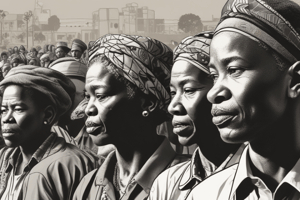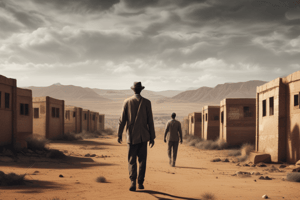Podcast
Questions and Answers
What is the supreme law of the land in South Africa, which guarantees fundamental rights such as equality and freedom of expression?
What is the supreme law of the land in South Africa, which guarantees fundamental rights such as equality and freedom of expression?
- The Bill of Rights
- The Constitution (correct)
- The Limitation Clause
- The Human Rights Act
What is the purpose of the Limitation Clause in the South African Constitution?
What is the purpose of the Limitation Clause in the South African Constitution?
- To restrict human rights
- To promote affirmative action
- To ensure that one person's rights do not infringe upon another's (correct)
- To protect the environment
What is the primary goal of affirmative action programs in South Africa?
What is the primary goal of affirmative action programs in South Africa?
- To address historical imbalances (correct)
- To promote economic growth
- To protect the environment
- To promote equality and fairness
What is the focus of the Broad-Based Black Economic Empowerment (BBBEE) initiative?
What is the focus of the Broad-Based Black Economic Empowerment (BBBEE) initiative?
What is the purpose of the Skills Development Act (SDA) and Skills Development Levies Act (SDLA)?
What is the purpose of the Skills Development Act (SDA) and Skills Development Levies Act (SDLA)?
What is the role of SETAs in South Africa?
What is the role of SETAs in South Africa?
What is the primary focus of the Basic Conditions of Employment Act (BCEA) and the Employment Equity Act (EE)?
What is the primary focus of the Basic Conditions of Employment Act (BCEA) and the Employment Equity Act (EE)?
What is the right recognized by the South African Constitution, which emphasizes sustainable development?
What is the right recognized by the South African Constitution, which emphasizes sustainable development?
South Africa's democracy was born in the year ______
South Africa's democracy was born in the year ______
The ______ is the supreme law of the land, guaranteeing fundamental rights such as equality and freedom of expression.
The ______ is the supreme law of the land, guaranteeing fundamental rights such as equality and freedom of expression.
The Limitation Clause ensures that one person's rights do not infringe upon another's ______.
The Limitation Clause ensures that one person's rights do not infringe upon another's ______.
The Constitution promotes equal opportunities and ______ for all citizens, regardless of race, gender, or disability.
The Constitution promotes equal opportunities and ______ for all citizens, regardless of race, gender, or disability.
Businesses are encouraged to adopt ______ friendly practices and support initiatives to reduce pollution and promote conservation.
Businesses are encouraged to adopt ______ friendly practices and support initiatives to reduce pollution and promote conservation.
The Basic Conditions of Employment Act (BCEA) and the Employment Equity Act (EE) aim to improve ______ conditions and address historical disparities in employment.
The Basic Conditions of Employment Act (BCEA) and the Employment Equity Act (EE) aim to improve ______ conditions and address historical disparities in employment.
The Black Economic Empowerment (BEE) and Broad-Based Black Economic Empowerment (BBBEE) initiatives aim to address ______ disparities by promoting the participation of historically disadvantaged groups in the economy.
The Black Economic Empowerment (BEE) and Broad-Based Black Economic Empowerment (BBBEE) initiatives aim to address ______ disparities by promoting the participation of historically disadvantaged groups in the economy.
SETAs play a crucial role in developing ______ programs and ensuring quality education in various sectors.
SETAs play a crucial role in developing ______ programs and ensuring quality education in various sectors.
Flashcards are hidden until you start studying
Study Notes
Democracy and Human Rights in South Africa
- South Africa's democracy was established in 1994, ensuring equality and human rights for all citizens.
- The Constitution, adopted in 1996, is the supreme law of the land, guaranteeing fundamental rights such as equality, freedom of expression, and access to education and healthcare.
Limitations on Human Rights
- The Limitation Clause allows for limitations on human rights to ensure one person's rights do not infringe upon another's.
- Affirmative action is considered fair discrimination under this clause, aimed at redressing past inequalities.
Inclusivity and Affirmative Action
- The Constitution promotes equal opportunities and inclusion for all citizens, regardless of race, gender, or disability.
- Affirmative action programs aim to address historical imbalances, ensuring fair representation in the workplace.
Environmental Rights
- The Constitution recognizes the right to a healthy environment and emphasizes sustainable development.
- Businesses are encouraged to adopt environmentally friendly practices and support initiatives to reduce pollution and promote conservation.
Labor Laws and Legislation
- The Basic Conditions of Employment Act (BCEA) and the Employment Equity Act (EE) aim to improve working conditions and address historical disparities in employment.
- These laws promote fair treatment, equal opportunities, and diversity in the workplace.
Economic Empowerment Initiatives
- Black Economic Empowerment (BEE) and Broad-Based Black Economic Empowerment (BBBEE) aim to address economic disparities by promoting the participation of historically disadvantaged groups in the economy.
- BBBEE focuses on broader empowerment beyond ownership, encouraging skills development and socioeconomic upliftment.
Skills Development
- The Skills Development Act (SDA) and Skills Development Levies Act (SDLA) aim to improve access to education and training, particularly for disadvantaged groups.
- SETAs play a crucial role in developing training programs and ensuring quality education in various sectors.
Industrial Action and Dispute Resolution
- The Labour Relations Act regulates industrial action and dispute resolution, distinguishing between protected and unprotected strikes.
- Bargaining councils and statutory councils help resolve disputes and set standards within specific sectors.
Democracy and Human Rights in South Africa
- South Africa's democracy was established in 1994, ensuring equality and human rights for all citizens.
- The Constitution, adopted in 1996, is the supreme law of the land, guaranteeing fundamental rights such as equality, freedom of expression, and access to education and healthcare.
Limitations on Human Rights
- The Limitation Clause allows for limitations on human rights to ensure one person's rights do not infringe upon another's.
- Affirmative action is considered fair discrimination under this clause, aimed at redressing past inequalities.
Inclusivity and Affirmative Action
- The Constitution promotes equal opportunities and inclusion for all citizens, regardless of race, gender, or disability.
- Affirmative action programs aim to address historical imbalances, ensuring fair representation in the workplace.
Environmental Rights
- The Constitution recognizes the right to a healthy environment and emphasizes sustainable development.
- Businesses are encouraged to adopt environmentally friendly practices and support initiatives to reduce pollution and promote conservation.
Labor Laws and Legislation
- The Basic Conditions of Employment Act (BCEA) and the Employment Equity Act (EE) aim to improve working conditions and address historical disparities in employment.
- These laws promote fair treatment, equal opportunities, and diversity in the workplace.
Economic Empowerment Initiatives
- Black Economic Empowerment (BEE) and Broad-Based Black Economic Empowerment (BBBEE) aim to address economic disparities by promoting the participation of historically disadvantaged groups in the economy.
- BBBEE focuses on broader empowerment beyond ownership, encouraging skills development and socioeconomic upliftment.
Skills Development
- The Skills Development Act (SDA) and Skills Development Levies Act (SDLA) aim to improve access to education and training, particularly for disadvantaged groups.
- SETAs play a crucial role in developing training programs and ensuring quality education in various sectors.
Industrial Action and Dispute Resolution
- The Labour Relations Act regulates industrial action and dispute resolution, distinguishing between protected and unprotected strikes.
- Bargaining councils and statutory councils help resolve disputes and set standards within specific sectors.
Studying That Suits You
Use AI to generate personalized quizzes and flashcards to suit your learning preferences.




